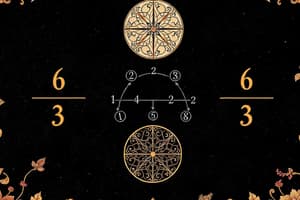Podcast
Questions and Answers
True or false: The value of the product of two proper fractions is smaller than each of the two fractions.
True or false: The value of the product of two proper fractions is smaller than each of the two fractions.
True (A)
True or false: To multiply a mixed fraction to whole numbers, you first convert the mixed fraction to an improper fraction and then multiply.
True or false: To multiply a mixed fraction to whole numbers, you first convert the mixed fraction to an improper fraction and then multiply.
True (A)
True or false: The value of the product of two improper fractions is more than each of the two fractions.
True or false: The value of the product of two improper fractions is more than each of the two fractions.
True (A)
True or false: To divide a whole number by any fraction, you multiply that whole number by the reciprocal of that fraction.
True or false: To divide a whole number by any fraction, you multiply that whole number by the reciprocal of that fraction.
True or false: To divide two fractions, you multiply the first fraction by the reciprocal of the second fraction.
True or false: To divide two fractions, you multiply the first fraction by the reciprocal of the second fraction.
True or false: The non-zero numbers whose product with each other is 1 are called the reciprocals of that number.
True or false: The non-zero numbers whose product with each other is 1 are called the reciprocals of that number.
True or false: When dividing a whole number by a mixed fraction, you first convert the mixed fraction into an improper fraction and then solve.
True or false: When dividing a whole number by a mixed fraction, you first convert the mixed fraction into an improper fraction and then solve.
True or false: The reciprocal of 59 is 95.
True or false: The reciprocal of 59 is 95.
True or false: The product of two proper fractions is smaller than each of the two fractions.
True or false: The product of two proper fractions is smaller than each of the two fractions.
True or false: When multiplying two improper fractions, the value of the product is more than each of the two fractions.
True or false: When multiplying two improper fractions, the value of the product is more than each of the two fractions.
Flashcards
Product of proper fractions
Product of proper fractions
True. Multiplying two proper fractions results in a smaller value than either original fraction.
Mixed fraction multiplication
Mixed fraction multiplication
True. Convert to an improper fraction before multiplying simplifies the calculation.
Product of improper fractions
Product of improper fractions
True. The product of two improper fractions is larger than the original fractions.
Dividing by a fraction
Dividing by a fraction
Signup and view all the flashcards
Dividing two fractions
Dividing two fractions
Signup and view all the flashcards
Reciprocals
Reciprocals
Signup and view all the flashcards
Dividing by mixed fraction
Dividing by mixed fraction
Signup and view all the flashcards
Reciprocal of 5/9
Reciprocal of 5/9
Signup and view all the flashcards
Study Notes
Multiplying Fractions
- When multiplying two proper fractions, the product is smaller than each of the two fractions.
- To multiply a mixed fraction by a whole number, convert the mixed fraction to an improper fraction first, then multiply.
Dividing Fractions
- To divide a whole number by a fraction, multiply the whole number by the reciprocal of that fraction.
- To divide two fractions, multiply the first fraction by the reciprocal of the second fraction.
Reciprocals
- Non-zero numbers whose product with each other is 1 are called reciprocals of that number.
Dividing by Mixed Fractions
- When dividing a whole number by a mixed fraction, convert the mixed fraction to an improper fraction first, then solve.
Product of Fractions
- The product of two proper fractions is smaller than each of the two fractions.
- The product of two improper fractions is more than each of the two fractions.
Reciprocal of a Number
- The reciprocal of a number is not always a simple inverse; for example, the reciprocal of 59 is not 95.
Studying That Suits You
Use AI to generate personalized quizzes and flashcards to suit your learning preferences.




